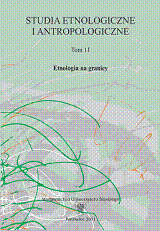Kultura alternatywna — tożsamość — komunikacja
Alternative culture — identity — communication
Author(s): Grzegorz StudnickiSubject(s): Anthropology
Published by: Wydawnictwo Uniwersytetu Śląskiego
Summary/Abstract: A social group functioning in Polish reality after 1989 combining features of punk and neoanarchism subcultures, associated with “anarcho-punk”, is combined with joint symbols, values and more or less direct social relations, interactions or social bonds. Despite some secondary local differences and ethnic as well as national flavour, neoanarchist environments and punk subcultures are treated as certain imagined communities constituting a peculiar point of view and “tool” for their participants, through which they perceive, interpret and evaluate the world surrounding them, behaviours or their or others actions. At the same time they are a “product” of “late postmodernism” and “mirror” in which the specificity and condition of the contemporary culture reflect and break. People connected with anarcho-punk through the network of mutual interactions within movement, both the direct and indirect ones, and thanks to numerous contacts with social system external to them very often use other fields of culture and human activity, among others decomposing the elements of popular culture in order to create their own system of references and meanings. Intergroup communication and jointly taken forms of activity play an important role in the process of identity gain or the choice of lifestyle as well as evaluation of socio-cultural reality. They are the means of conveying symbols, patterns of thoughts, myths enabling the interpretation of the world. Thus, they guarantee the”reproduction” of an anarchist discourse. Participants joining the actions within the movement do not only use the already-existing system of meanings, but also modify it and adjust to the changing socio-culture background. Such socially created and approved system of symbols do not only guarantees the continuity of the movement, but also serves the formation of new values, strategies or social practices which serve the group and their members to create new meanings, a critical description and working out the strategy serving the opposition in the light of dominating discourses, structures or centres of power. Thanks to symbols, repeated, interpreted, redefined constantly anew, the movement members give sense to their actions, valorize and structure the world surrounding them, define their own place in the world, interpreting their own experiences and direct their actions.
Journal: Studia Etnologiczne i Antropologiczne
- Issue Year: 2011
- Issue No: 11
- Page Range: 185-197
- Page Count: 13
- Language: Polish

